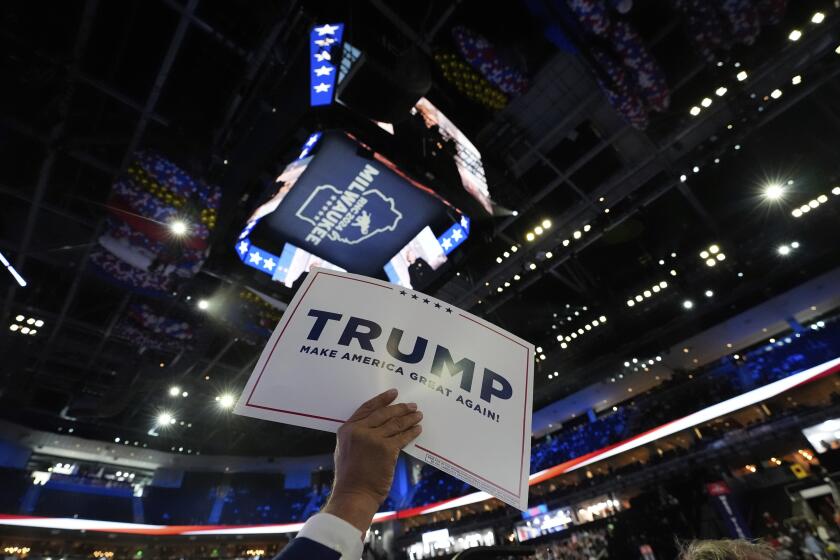Too many Americans support political violence. It’s up to the rest of us to dissuade them

- Share via
Donald Trump’s shooting wasn’t a complete surprise. While no one could have predicted the specifics, researchers and policy experts have been concerned for years that this election season would bring an outbreak of political violence. For weeks, I’d been counting us lucky as each day passed without it happening.
America saw political violence following its last presidential election, after all. At the time, one expert put it this way: “A lot of people want to see January 6 as the end of something. I think we have to consider the possibility that this was the beginning of something.” And for more than a decade, political figures (including Trump) have engaged in rhetoric that seems to endorse and promote violence, reflecting on the need for “2nd Amendment remedies” or the possibility of a “bloodbath” if election results are not to their liking.
Despite partisan accusations by J.D. Vance and others, Thomas Matthew Crooks’ assassination attempt isn’t exceptional in the annals of American firearm violence.
Fortunately, there is a growing body of research on what leads to political violence, who’s most at risk for committing it and how it might be prevented. Here at UC Davis, we have been conducting a large, annual, nationally representative survey of American adults on all those topics since 2022. We’re contacting the same people each year, which allows us to measure real change over time.
In 2022, to our great concern, 33% of American adults thought physical violence was usually or always justified to advance at least one political objective (we provided a list of objectives for them to consider), and 14% strongly expected civil war in the next few years. But both percentages fell in 2023, to 25% for justification of violence and 6% for an expectation of civil war. That good news comes with a caveat: 2023 was not a federal election year. A first look at our 2024 data suggests, though, that there has not been a rebound this year. There was more good news: In both 2022 and 2023, the great majority (about 70%) of people who thought violence was justified were unwilling to participate in it themselves.
Trump frames the 2024 election as his strength versus Biden’s weakness. Now that message is paying off on an entirely new level.
Not all the news was good. Of those who strongly expected civil war in 2023, 39% also strongly agreed with the statement that “the United States needs a civil war to set things right.” In both years, between 1% and 2% of all respondents thought it very or extremely likely that at some future time they would shoot someone to advance a political objective. That’s a very small percentage (and survey estimates of small percentages can be unreliable), but with more than 250 million adults in the United States, 1% of survey respondents would extrapolate to 2.5 million people.
We learned that, not surprisingly, support for political violence was not evenly distributed across the population. Among the groups more likely to support such violence (and, in most cases, more willing to participate in it) were men, young people, Republicans (and MAGA Republicans in particular), those who endorsed many forms of fear and loathing (racism, sexism, homophobia, transphobia, xenophobia, Islamophobia and antisemitism) and firearm owners who had assault-type rifles, purchased firearms during the COVID-19 pandemic or frequently carried weapons in public.
This research arose from the assumption that violence, including political violence, is a health problem. (If it isn’t, as a federal health official said 30 years ago, then why are so many people dying from it?) Participation in violence is, therefore, a health behavior.
That understanding helps to translate the research on political violence into recommendations for prevention, which are based on strong evidence that individuals’ health behaviors are influenced by the opinions and behaviors of the people around them. Prevention is a worthy goal; although we can’t eliminate political violence, we can minimize it.
The great majority of us who reject violence must become agents for change. Our declarations that political violence is unacceptable, if made often enough by enough of us, can create conditions in which political violence is less likely to occur. This won’t be as easy as it sounds. It means having sometimes-awkward conversations with family, friends and members of our social networks. It can mean becoming, for this specific purpose, an influencer on social media. Where necessary, it means telling our elected officials and others in positions of leadership that their pro-violence rhetoric is unacceptable.
By itself, this won’t be enough. There are people who are committed to violence and are beyond persuasion. Law enforcement has strategies for them — but we are part of those strategies too. Any one of us might see the social media post or hear the conversation that conveys a threat to commit political violence. When that happens, we must be willing to communicate that threat to those who can do something about it.
Those of us who reject political violence aren’t mere observers of a national train wreck. We are on the train. Will we do everything we can to apply the brakes? The proper answer to that question should be: Yes.
What will your answer be?
Garen Wintemute is a distinguished professor of emergency medicine at UC Davis and director of the California Firearm Violence Research Center.
More to Read
A cure for the common opinion
Get thought-provoking perspectives with our weekly newsletter.
You may occasionally receive promotional content from the Los Angeles Times.








